This January and February, we’ll be finishing up our look at the second season of Star Trek: The Next Generation and moving on to the third year of the show, both recently and lovingly remastered for high definition. Check back daily for the latest review.
It’s really strange that this is our first Pulaski-centred episode. It’s even stranger that it’s the shows only Pulaski-centred episode, given she’s a new character being inserted into an established ensemble. It’s even stranger-er that the episode doesn’t really seem to have much to say about Pulaski apart from the fact that she is the show’s new doctor – and she’s a bit of an idiot. Which is not necessarily what you want when you’re trying to endear a new character to the audience.
Then again, Unnatural Selection is a pretty good indicator of where Star Trek: The Next Generation is right now. The show hasn’t quite figured out that it’s a good idea to anchor character-centric stories in the character upon which that intended to centre. It’s one of the most successful aspects of Michael Piller’s approach, and part of what really revitalised the writing in the show’s third season. As it stands, Unnatural Selection seems to be a story about medical stuff, so it gets to focus on Pulaski. Who is really just sort of there.
Pulaski is a polarising figure. Fandom tends to hate her quite a bit, and it’s easy to see why. She’s a rather blatant rip-off of Doctor McCoy, something that even Diane Muldaur has conceded. However, it forgets that McCoy can’t really work on The Next Generation. He’s a character who doesn’t fit inside “the Roddenberry Box”, the strange “no conflict” rule that Roddenberry insisted upon when he created The Next Generation, oblivious to the fact that Kirk, Spock and McCoy bickered all the time.
Indeed, this limitation really ham-strings Pulaski. You can tell that she’s designed to be this assertive and combative force, but the show never really lets it come across. She butts heads with Captain Picard several times, but there are never really any sparks. The closest Picard comes to a verbal smackdown is uttered as polite (but firm) conversational post-script. “Doctor, God knows I’m not one to discourage input, but I would appreciate it if you’d let me finish my sentences once in a while.” Compare it to his dressing down of Wesley in The First Duty, or his vigorous defense of Data in The Measure of a Man. It even feels somewhat lifeless when compared to his exchanges with Crusher back in Symbiosis.
Similarly, Pulaski’s bickering with Data continues to feel ill-advised. It’s obviously designed to evoke the relationship between Spock and McCoy, but it doesn’t work because Data seems incapable of defending himself. Spock would often make an acerbic sarcastic response to McCoy’s jibes, while the best that Data seems to be able to do is to miss the point entirely. As we’ve discussed before, it hardly seems fair for Pulaski to pick on Data, seeming more like bullying than banter.
And then there’s the fact that the show treats Pulaski like the elephant in the room. At this point in its run, The Next Generation has treated its female leads in a remarkably shoddy manner. Two of the three female leads departed the show at the end of the first season. Marina Sirtis chose to stay, but has confessed that she spent a lot of the first season afraid that she would be fired. And then, when she did return, she was made the focus The Child, hardly The Next Generation’s finest feminist hour.
So you’d imagine that they’d want to start right with the new female regular character. Although Muldaur is not part of the opening credits, and there’s a conscious distance between herself and the rest of the cast throughout the season – she doesn’t tend to hang around in the background unless she’s needed, for example – she is effectively a lead character. She’s only absent from two of the second season’s episodes, and she’s given a nice “… as …” credit in the style of the other regulars. So you’d imagine that the show might want to integrate her into the ensemble.
And there are a few token attempts made over the course of the season. She gets to hang out with Geordi and Data in Elementary, Dear Data, got connected to Riker’s father in The Icarus Factor and bonded with Worf in Up the Long Ladder. However, she feels very distant from the core characters. Pulaski could, quite easily, be one of those changeable chief engineers who kept popping up during the first season, just with a dash more personality and a little more job security. There’s no real attempt to fill in her character, to tell us who she is.
Being honest, it seems like the show wants to avoid the fact that it has replaced Crusher at all. Wesley spent The Child wondering about his future on the ship without his mother, but she’s never really been mentioned or discussed since. A viewer who joined the show at Where Silence Has Lease would have no idea that it’s only Pulaski’s second episode. To be fair, it’s possible for a show to over-compensate with a new regular, as Star Trek: Voyager did with Seven of Nine, but completely avoiding the fact that there’s a new face around makes it all the more awkward.
Unnatural Selection at least broaches the idea that Picard doesn’t have quite as well-defined a working relationship with Pulaski as he does with the rest of his officers. “Hopefully the mission will give me further opportunities to assess the performance of our new Chief Medical Officer,” his opening log helpful and clumsily explains. However, a lot of it feels a little awkward, as the episode tries to coast through by suggesting Pulaski has actually been working hard off-screen to integrate herself.
Having Troi and Pulaski hang out is important for the plot, but this is the first time we’ve really seen the pair interact. Hearing Troi refer to Pulaski as “Kate” feels like a lazy way in insinuate a personal relationship without putting any real ground-work into it. Pulaski and Troi haven’t spent much time together outside The Child, and even then it seemed like there was little room for personal interaction.
It might have made sense for Pulaski to share her concerns about Picard with Data for example, one of the few members of the main cast we’ve actually seen her spend time with. Alternatively, she might want to talk to Worf about settling into a new role, since he’s also adjusting to a new position. (And Pulaski and Worf actually generate a weird complimentary chemistry towards the end of the season.)
Of course there’s a reason to talk to Troi – Troi is the ship’s counselor and you imagine that dealing with this sort of bland dysfunction is what she does when she’s not sensing aggression from the attacking Romulans. At the same time, it’s the attempt to suggest that Pulaski has already become so close to Troi that they are on a first-name basis that feels a little off-putting, as if the show is avoiding any character development by trying to assure us that it happened off-screen.
(Maybe this would be less of a problem later in the season. The Measure of Man features Pulaski playing poker with the main staff, and it’s not too hard to imagine her as part of the gang at that point. However, Unnatural Selection is built around ho she’s an unknown quantity to Picard, so trying to argue she gets along fine with everybody else seems a little counter-intuitive, particularly when we’ve seen little evidence of her getting along with anybody by Data and Geordi.)
While it’s nice to have a hint of conflict among the ensemble, Unnatural Selection doesn’t work for a variety of reasons. For one thing, there are no sparks to the conflict between Picard and Pulaski, as discussed above. There’s also a sense that this is one of those episodes that is straining to make it seem like everybody is always perfectly reasonable. The script doesn’t show us how wonderful Pulaski is, doesn’t allow her to prove herself. Instead, we’re hammered with testimonies from other characters.
When Picard asks for Troi’s professional opinion, the counselor offers, “I’ve never met a more dedicated physician. I would say she has a passion for her work.” Picard blandly replies, “Yes, of course. I entirely agree.” When Picard tries to get a reference from her former superior, Taggart laments the fact that he had to lose her to the Enterprise. “I would have given her a shuttle if it would have kept her here.”
(The show also over-plays its hand by explaining how flattered Pulaski was to end up assigned to the Enterprise. I get it’s a big deal, but Pulaski’s willingness to challenge Picard carries a lot more weight if we aren’t also assured that she worships the ground he walks upon. It seems like – as with Troi’s use of her first name – the show is trying to hedge its bets here. Make her gruff, but not too gruff. Have her challenge Picard, but make sure the audience knows she really likes him.)
Indeed, Pulaski is apparently something on an intergalactic celebrity, with supporting characters quick to sing her praises for any members of the audience who can’t accept a random fictional character without other random fictional characters telling them how awesome she is. Pulaski is the “author of Linear Models of Viral Propagation”, which is apparently “still the standard.” Kingsley bluntly states, “I can’t think of anyone I’d rather be dealing with.”
“Show don’t tell” is one of the first rules of drama, and it’s worth noting that Unnatural Selection flunks rather inelegantly. For all that the supporting characters praise Pulaski as a character, the entire plot hinges on the character making a stupid mistake. Not only does it suggest that Picard (who was entirely right) knows more about medicine than she does, it also suggests that the audience know more about 24th century medicine than the ship’s surgeon. Nobody with an ounce of common sense could think Pulaski’s “let’s beam somebody up from that quarantine zone” idea was the right way to go.
Risking her own life on the shuttle is one thing, but her decision to bring Data along hardly makes her seem sympathetic. She assures him that he’s at no risk from any affliciton (despite the events of The Naked Now), but he points out, “That is by no means certain, doctor.” Pulaski’s willingness to ask another person to take a risk like that – even a statistically minor risk like that – and so casually dismiss their concerns suggests she still sees Data as little more than an object.
As the season’s first and only Pulaski-centric episode, Unnatural Selection is probably the best point to talk about about the behind-the-scenes difficulties that arose from the decision to replace Gates McFadden with Diana Muldaur. The first two years of The Next Generation suffered from internal turmoil, and – reportedly – Muldaur was something of a focal point for that during the show’s sophomore season. “I was a rough show to do,” Muldaur confessed in in hindsight. “It was a marvelous show to do. It’s very well loved, I think.”
The actress has repeatedly stressed how close she was to Gene Roddenberry, suggesting that he was the only reason she hung around. “Gene died during my season, and there was no reason to be there,” she stated. “He was the creative one. He was the genius. And Paramount, more or less, was just business. Business, business, business.” Muldaur appears to be a little confused here. Roddenberry actually died during the show’s fifth season, and remained actively involved into the show’s third and fourth years.
However, after the second season, it must be acknowledged that his influence was greatly reduced. It’s quite possible that Muldaur didn’t want to remain involved in The Next Generation after it was wrestled away from Roddenberry. It has also been suggested that there was some tension with the cast over the hiring of Muldaur to replace Gates McFadden, even though Muldaur is quick to downplay that and suggest that she never planned to stick around:
How close did the reality of playing Pulaski come to what you had in mind for this woman?
I think it was just starting, but I never really planned to be there very long. As it turns out, I used the show where I aged to show to the L.A. Law people, to get L.A. Law. That’s the film they looked at.
So you knew going in that TNG would only be a one-season gig for you?
Yes, as far as I was concerned.
Were you relieved, then, when they brought back Gates McFadden for season three?
It didn’t matter. There’s no bringing people back. People have tried to create some kind of something out of it, but she played one part and I played a totally different part. I played a totally different person. I was much closer to the original doctor, which is what I wanted to do, which I thought was more fun for me to do. So, no, it would not have been good to have continued very much longer, even though everyone was really lovely.
Muldaur has been tough to draw on the matter – to the point where getting her involved on the second season Next Generation blu rays, even outside of the cast reunion, was treated as a major coup, noting her “elusive” approach to discussing the show.
At the same time, as with so much about Star Trek, there’s a lot of disagreement and discussion on the point – a variety of conflicting accounts as to what really went on behind the scenes. Muldaur herself has implied that she had trouble with the rest of the cast over her salary, which was larger than that of most of the rest of the ensemble:
There were some wonderful people who came through. Wonderful directors, wonderful writers. A couple of the actors I thought were wonderful to work with. I came in with a better salary than most of them, so I had a problem with that, as far as the people who had been there for a year had been concerned – cause I came in right up there. But that doesn’t bother me, because I’m so used to that, through the years.
As a result, Pulaski remains an anomaly among the regulars on The Next Generation, standing very much apart from the rest of the main cast. Although part of the senior staff, and appearing in all but two episodes of the season, Muldaur was never added to the main credits, instead treated as a guest star.
She has remained apart from the rest of the ensemble after her time on the show, left out of reunions that feature other part-time regulars like Denise Crosby and Wil Wheaton. Star Trek had a habit of bringing back former regulars (and even recurring guest stars) for the odd affectionate guest spot. Even Kes came back to Star Trek: Voyager, while Crosby and Wheaton become recurring guest stars after leaving The Next Generation. The closest we get is a verbal background shout-out to Pulaski in Endgame, over a Starfleet intercom.
Pulaski is a character who tends to provoke strong reactions. I don’t hate her. I think the fundamental idea was flawed, but not fatally so. However, the execution was just terrible. I’m fond of Muldaur’s work, and the promise of having somebody on the Enterprise who speaks their mind is a good idea. However, The Next Generation wasn’t a show quite ready for that level of candor, and so Pulaski’s irritability seems either misjudged (as towards Data) or too tempered by the need to have everybody get along (as with Picard here).
The fact that the show’s only Pulaski-centric episode is a miss certainly doesn’t help. Unnatural Selection should be our dramatic introduction to Pulaski. Here’s that character who has been around for a few episodes now, but this is why you should care about her! Sort of like The Raven (and most of the rest of Voyager) was for Seven of Nine, or Afterimage was for Ezri Dax. Instead, Unnatural Selection seems to have picked the worst plot imaginable, which draws attention to the worst aspects of Pulaski.
For one thing, it’s a reheat of The Deadly Years, a mediocre premise from the classic show. There’s a sense that we’ve seen this before. It draws attention both to the fact that Muldaur was a guest star on that series and that Pulaski is the second-oldest member of this crew. Here’s a boring old plot from the old show, featuring a boring old guest star! it seems to scream. It also relies on Pulaski being stubborn and headstrong, but undermines it by making her incorrect and a softie inside. Pulaski is strong-willed and determined, but she’s prone be stupid and sentimental!
The plotting is also rather terrible. Like The Schizoid Man, Unnatural Selection seems to assume the show can establish tension simply by stringing a bunch of technological-sounding words together. Outlining the solution to the problem of the week, O’Brien tells us, “Well, I’d have to get into the biofilter bus to patch in a molecular matrix reader. That’s no problem. But the waveform modulator will be overloaded without the regeneration limiter in the first stage circuit.” I’m sure the audience was on the edge of their seat.
It doesn’t help matters that Unnatural Selection feels incredibly sanctimonious and moral panicky, released at the tail end of the eighties just as the Human Genome Project was entering public focus. There’s something unnervingly conservative about Unnatural Selection, which seems to suggest that maybe science shouldn’t go poking around in human genetics. Of course, this is entirely in keeping with the franchise’s general fear of transhumanism – dating back to the very first aired episode, Where No Man Has Gone Before, and epitomised in Space Seed.
“We could be looking at the future of humanity,” Pulaski informs us at one point, outlining the potential of the process, and bedazzled by the lure of scientific knowledge – which is, you know, what this early idealised Roddenberry-driven Star Trek is supposed to be about. We’re meant to be excited at the unknown, curious about the future. After all, aren’t Roddenberry’s idealised humans a hyper-evolved version of mankind?
Don’t worry, Picard is quick to put a downer on that. “At least Doctor Kingsley’s vision of it,” he sarcastically remarks. Stupid scientists! Doing research and stuff! How dare they! It takes a while for Pulaski to really learn this (and she does through a combination of stupidity, recklessness and naivity – so, em… yay for positive portrayals of scientists!), but she eventually comes around to it.
“Just as changes in evolution are known to be caused by changes in the environment, we now know the process also works in reverse,” she handily moralises. “An attempt to control human evolution has resulted in a new species that’s lethal to its predecessors. The children will be condemned to live out their lives in isolation. Quarantine of the Darwin Station must be maintained for ever.”
It all seems quite terrified at the idea of poking around with human genetics – an understandable fear in the wake of the failure of eugenics and other genetics-influenced moral and political philosophies, but something that feels very close-minded. There are a lot of valid debates to be had over the exploration of the human genome, but “it’ll make us all age quickly and die when it unleashes a killer plague!” seems a little sensationalist.
Then again, this isn’t really something specific to Unnatural Selection. Later this season, in Up the Long Ladder, it’s suggested that wiping a sleeping clone out of existence doesn’t merit debate. The original Star Trek revealed that genetic tampering lead to a war that almost destroyed the planet, with Khan from Space Seed and Colonel Green from The Savage Curtain both dabbling in eugenics with horrific consequences. It’s just pushed to the fore here.
Which does raise an interesting point. Given how so much of the second season seems built around emulating the classic Star Trek – to the point where this plot centres on a repeat guest star from the show and borrows a plot from a bland second-season episode – it feels strange that the Federation’s historical insecurity about genetic engineering is completely ignored. After the Eugenics Wars, it seems strange that Kingsley is experimenting so radically and so freely. (In fact, the later episode Doctor Bashir, I Presume would confirm that genetic engineering had been outlawed by the Federation, a development that is hardly a sharp left-swerve.)
Although, I suppose some half-decent stuff does come of this. Unnatural Selection cements O’Brien as a recurring guest star, even naming the character. O’Brien would go on to become the franchise’s first working-class character, and a regular on Star Trek: Deep Space Nine, as well as the only character to appear in the opening and closing episodes of two different Star Trek spin-offs.
The use of O’Brien here only came about when the show decided to veer away from an awful-sounding subplot involving Rina, a stunningly beautiful young officer who causes the men around her to have comedic mishaps, because the Federation apparently doesn’t have sexual harassment seminars. Dropping Rina seems to have been a good idea, because it avoids a bunch of painfully sexist moments in two season already over-stuffed with painfully sexist moments.
It is worth noting that it seems like at least some elements of Rina were recycled by the show, albeit in a slightly less cringe-inducing manner. A few episodes later, the show would introduce another young female engineering assistant in the form of Sonya Gomez. Instead being so attractive that she caused the men around her to have accidents, she was just clumsy and uncertain herself.
I kinda like Gomez, so I guess I should appreciate that Unnatural Selection probably played some tiny role in her development. Outside of that, and the introduction of O’Brien, what else is there to recommend Unnatural Selection? Well, I suppose it got Diana Muldaur her job on L.A. Law, which earned her a massive amount of deserved acclaim and an Emmy-win, as well as one of the most memorable departures in the history of television. So I guess that Muldaur is probably reasonably fond of Unnatural Selection.
Unfortunately, those really add up to the only reasons to love Unnatural Selection – avoiding being actively sexist and playing a small role in winning Muldaur an Emmy. It’s not a lot, and it’s certainly not something the makes watching the episode any better. Still, that puts it well ahead of some of the other terrible episodes this year, some of which don’t avoid being actively sexist and none of which helped anybody win an Emmy.
Read our reviews of the second season of Star Trek: The Next Generation:
- The Child
- Supplemental: Phase II (1978) – The Child
- Where Silence Has Lease
- Elementary, Dear Data
- Supplemental: Embrace the Wolf
- The Outrageous Okona
- Loud as a Whisper
- The Schizoid Man
- Unnatural Selection
- Supplemental: Deep Space Nine (Marvel Comics) #3-4 – The Cancer Within
- A Matter of Honour
- The Measure of a Man
- Supplemental: Myriad Universes – Echoes and Refractions: Brave New World by Chris Roberson
- Supplemental: The Measure of a Man (Extended Cut)
- The Dauphin
- Supplemental: Masks by John Vornholt
- Contagion
- The Royale
- Time Squared
- The Icarus Factor
- Supplemental: The Lost Era – Deny Thy Father by Jeff Mariotte
- Supplemental: (DC Comics) Annual #2 – Thin Ice
- Pen Pals
- Q Who?
- Samaritan Snare
- Up the Long Ladder
- Manhunt
- The Emissary
- Peak Performance
- Shades of Grey
Filed under: The Next Generation | Tagged: Benjamin Sisko, Deanna Troi, deep space nine, Google, Icarus Factor, jean-luc picard, Marina Sirtis, Michael Piller, Next Generation, Star Trek Next Generation, star trek: deep space nine, StarTrek, Troi, Unnatural Selection, Where Silence Has Lease |



















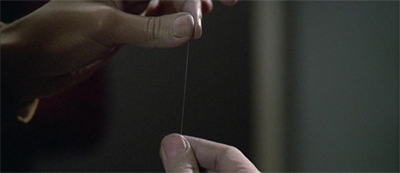


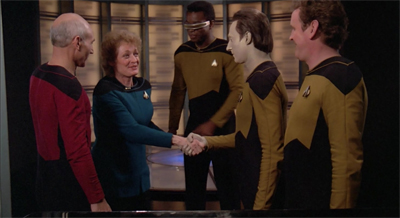






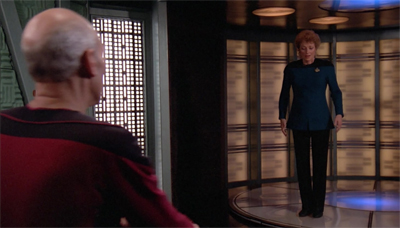
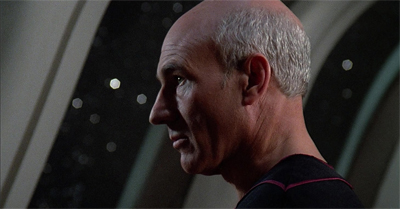
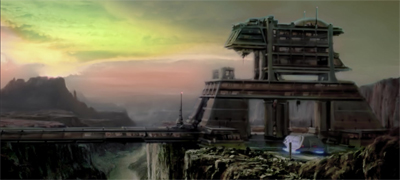





Perhaps the sentence “It’s even stranger-er that the episode doesn’t really seem to have much to saw about Pulaski…..” should be rewritten as “It’s even stranger-er that the episode doesn’t really seem to have much to saw apart Pulaski…..” in relation to the ire that many Star Trek fans have with Dr. Pulaski.
Ha! Harsh, but not necessarily unfair. I think Pulaski does get a harsh time from fans, by virtue of simply not being Crusher. And all that behind the scenes stuff just makes me sad.